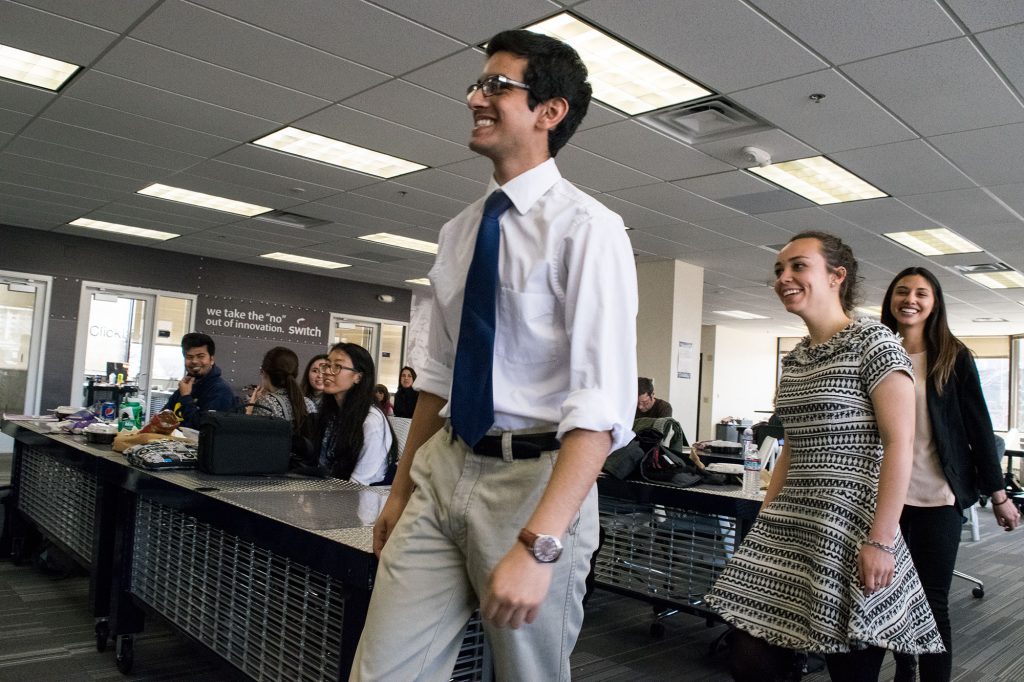After spending a weekend in Reno at the J-School Hackathon, I can finally see the light at the end of the tunnel that is a semester in the Reese News Lab at the School of Media and Journalism at the University of North Carolina at Chapel Hill. More plainly put, I definitely understand better what we need to be working on each week to create a viable, feasible, and desirable media product and to give a successful pitch at the end of the year.
The Hackathon was essentially Reese in a weekend, with the addition of professional speakers who gave great insight into human centered design and the startup process.
The Creative Conflict
The theme of the weekend was chatbots. Going into the event with very little knowledge of this technology, I now understand that chatbots can be a great way to convey information or manage different lifestyle tasks through a personalized interaction with the user.
My group started off the weekend much as we started off this semester in Reese. We tried to identify different societal problems, created characters who would use our product, and went out into the community to get potential user feedback.
My team got off to a bit of a rocky start, due to creative conflict. We did not agree on an idea to pursue until about 5 p.m. that evening – and we needed to be finished working by 10 p.m. We ultimately decided to design a money management chatbot marketed toward Generation Z to help increase financial literacy among this demographic.
The rest of the evening, we worked diligently to create the design of the bot to appeal to this young public, fleshed out the revenue model, and decided on a marketing scheme. The next morning, we hurriedly put together our slide deck, designed a quick graphic, and practiced our 5-minute pitch.
The Pitch

The author at the 4th Annual J-School Hackathon at the University of Nevada-Reno. Photo by Adrianna Owens.
During the pitches, I was very impressed with the ideas the other groups had come up with, and I knew we had some tough competition against our startup, “Green Guide.” I was very surprised when our group was announced as the winner for the weekend.
We did not have the best design, the most original idea, or even a working prototype, but I think what the judges saw in our startup was the potential to grow and become a working product. We had the research to prove that our idea was desirable, feasible, and viable.
Our survey research on our peers showed that most people our age are pretty lost when it comes to financial management; this was a huge market to tap into. And though we didn’t have a working prototype, we planned to put our bot on Facebook, as almost all of our respondents said this was their most used social network. With a little help from a software developer, we could have this bot up and running in no time.
The Value of Viability

ProPublica’s Celeste LeCompte at the 4th Annual J-School Hackathon at the University of Nevada-Reno. Photo by Adrianna Owens.
Lastly, I think our viability factor ultimately made us the strongest team, and when you’re pitching to a group of people who may potentially invest in your idea, you need to make sure it’s worthwhile investment. Our product had great potential for revenue generation, as we hoped to pursue an affiliated marketing strategy, partnering with banks and retail companies to promote their products through our bot.
I learned more than I ever thought I could about the startup process in one weekend, and I was grateful for the opportunity to learn from experts in the field and work with students from around the country. I hope my takeaways from the event will continue to fuel me and my team throughout the rest of the semester in the Lab.
First, I learned that conflict can be healthy. As long as at the end of the day you can work together as a team to work on one unified idea, the creative process that can come out of a constructive argument can be extremely valuable.
Secondly, I think research is the most important part of this entire process. We should focus less on the actuality of the product than on making sure we have the facts and figures to show that our product could really be beneficial to the Chatham community.
Lastly, money is key. Money isn’t everything, but unless you can prove your idea will be profitable, or at least sustainable, no matter how great or innovative the idea is, you will never actually be able to implement it.
Celeste LeCompte, the director of business development at ProPublica, shared with us a number of money-making strategies for our startups, including charging our users for the product, an idea we have often shied away from in the Lab this semester. But if you can explain how you are helping a customer, or helping them avoid doing something, you have a pretty good value proposition on your hand. If a user has to pay, your content will be their reward.
Kelly Jasiura, originally from Buffalo, NY, is a senior at the University of North Carolina majoring in Public Relations in the School of Media and Journalism as well as Public Policy. After graduation, Kelly hopes to work in public relations for a non-profit or policy group to use her communication skills to share information about policy decisions and help make them more clear and understandable to the public. This semester, Kelly is working as an intern in the Reese News Lab to create a new media product that will fill the information needs of the residents of a nearby county.

